- Home
- Peter Cawdron
Shadows Page 10
Shadows Read online
Page 10
Jamie brought over a middle-aged man, seating him on the end of the bench. Susan finished up with a young girl, using a cleaning cloth and medical tape to secure what she thought was a broken finger to a good finger. Jamie took the girl away and the man swung his legs up into the sink.
“OK, what have we got here?” Susan asked, looking at his legs. Like the doctor, hours before, she no longer looked at her patients, focusing only on their wounds. At the time, she hadn't understood why the doctor couldn't have looked up at her, but now she knew. It was a job, a bloody, tiring, thankless effort. Depersonalizing the task was the only way to get through the sheer volume of patients. It wasn't that she didn't care or wasn't careful, it was that the only way to care was to focus intently on each injury as it passed before her.
Blood had clotted around multiple cuts leading from the man's knees down to his feet. He still had one boot on, but his coveralls had been cut away at his thigh, exposing his wounds.
“I was trapped for a few hours under a wall of fallen concrete cinder blocks.”
“Crush injuries should be tended to by the doctors,” Susan said, scrubbing her hands and forearms with soapy water as she called out, “I'm going to need more soap here. Can someone get me a refill?”
“On it,” Olivia said, turning away from her and rummaging around under the bench behind Susan.
“They sent me here,” the man said. “Told me I was a category four.”
“OK, let's take a good look,” Susan said, not knowing what category four meant but respecting the doctor's triage system. She used the tip of a short kitchen knife to carefully pick at dirt and debris in his wound, gently washing away as much of the dirt as she could with water squeezed from a sponge.
“I'm not going to lie to you,” she said. “This looks pretty bad. You should really be seen by a doctor.”
Out of the corner of her eye, she could see him nodding in agreement as she continued, arching over the sink, carefully examining his legs.
“I'm sorry, but this is going to hurt. I've got to clean out your wound before I can stitch you up.”
Using her elbow, she nudged the tap toward the man so the trickle of warm water began washing over his legs. Susan was vaguely aware of another woman standing on the other side of the bench, holding the man's hand for support as he grimaced in pain. She must have been a relative, Susan figured, but as hunched over as she was she didn't make eye contact.
“We've got a lot of bleeding here,” Susan said, turning to Olivia. “I'm going to need you to apply pressure to the back of the calf.”
She raised his leg, resting his ankle on the other side of the kitchen sink. There was considerable abrasion, with long strips of skin torn from the shin bone. A flap of loose skin hung down from the back of the man's calf muscle. The water ran red with blood.
Olivia came around beside Susan with a bunch of wet cloths. She had wrung them out, but soap bubbles still sat in the coarse material.
“Here,” Susan said, pointing, rolling the man's leg gently to one side so she could get a better look at the torn calf muscle.
Olivia clamped her hands below the man's knee, saying, “The needle closest to you is sterile and threaded.”
“Good,” was all Susan could manage in reply. Her narrow focus on the bloodied leg before her caused the rest of the world to fade and recede into the background. She wiped away the blood with a cloth while reaching out with her other hand and picking up the needle, never taking her eyes off the wound. Sweat dripped from her forehead.
The man grimaced as she began sewing up the tear in his muscle. He rested his hand on her shoulder, squeezing as she threaded the needle back and forth through the torn tissue. No one else had touched her. They'd all sat with almost formal rigidity, as though she were some high priest, but this stranger reminded her of her father. In the back of her mind, she wondered where he was, hoping he was OK, hoping someone was caring for him as she was caring for others.
“Scissors.”
Olivia handed scissors to her. Susan snipped the surgical thread and handed the scissors back to her, shifting her focus to a loose flap of skin on the man's ankle. Carefully, she cleaned the skin, trying not to disturb the weeping flesh too much, and then stitched the skin back in place. She breathed a sigh of relief as she dried and bandaged the wound.
His other leg wasn't as bad. She had him lift the leg she'd treated out of the sink so she didn't get the fresh bandage wet. There was severe bruising to the man's left leg along with several small lacerations that didn't require stitches and a light abrasion on his shin, similar to the one she'd treated on his right leg. Susan cleaned his leg gently and then dried his leg with a damp towel. Although she'd used medical bandages on the right leg, she bandaged his left leg with strips of cleaning cloth to keep her supply to sterile bandages in reserve.
As she finished up the man said, “Thanks, Sunshine.”
Susan was stunned. She looked up and for the first time realized she'd been treating her father. Her mother, standing opposite her, had tears in her eyes.
“Dad.”
Her father squeezed her shoulder, adding, “You're doing a wonderful job, Honey.”
Jamie helped Susan's father down from the bench and the assembly line they'd constructed kept rolling as an elderly lady shifted down the stainless steel bench for treatment. She had her arm in a hastily constructed, bloodied sling.
Susan looked at her father for a moment. He smiled and waved as he hobbled away.
She turned back to the old lady and said, “Hi, we're here to help. Can you tell me what happened to you?”
Time blurred.
One patient blended into another.
Occasionally, the nurse came over and checked on them, asking if they had any questions and telling them they were doing a great job. Susan wasn't sure how many patients she'd tended to, only that her back hurt from leaning over the kitchen bench for so long. She was surprised when the wall-screen lightened with the coming of dawn. Finally, the tide of injuries turned and she stood there watching the wall-screen and sipping a glass of water. There were no more stars in the brooding sky. Smoke continued to billow from the crater beyond the crumbling mound. The doctor walked up behind her with one of the nurses.
“Thanks for all your help,” the doctor said to the four of them, shaking each hand profusely. They'd been up for almost twenty four hours. It had been roughly eighteen long hours since the quake, and they were exhausted.
“Glad we could help,” Olivia said on behalf of them. Susan smiled in agreement. They'd worked well together as a team.
“Sheriff Cann has set up cots in the mayor's office,” the nurse said. “They've blacked out the windows so we can get some sleep.”
“Sounds good to me,” Susan said, watching as the sun peaked over the horizon.
They wandered through the mass of people lying on the floor, wrapped in blankets. Sheriff Cann was arranging more portable cots in front of the wall screen. He had several men helping him pull them out of a crate, setting them up around the floor. The smell of grits wafted from the kitchen but Susan was too tired to think about eating. She wandered into the mayor's office in a daze and barely registered her head hitting the pillow on her cot. Someone pulled a blanket over her.
Chapter 09: Quorum
Susan sat on one of the a chairs outside the mayor's office. It was four in the afternoon and most of those that had initially fled to the Uppers for safety had left for their homes. The cafeteria was still functioning as a hospital ward, but it was only the serious cases that remained. Most of those Susan had treated were already gone.
The faint smell of smoke sat in the air, a burnt tinge that threatened to lash at her nostrils if it got stronger.
Nothing had changed on the wall-screen. Smoke still billowed from a crater hidden from sight behind the crumbled remains of the embankment. To the right, the view looked surprisingly normal, with the bodies of cleaners still lying crumpled on the hillside, but the left half o
f the massive wall-screen appeared hellish in its fury. The ferocity with which the smoke rose, rushing up and enfolding on itself, made Susan wonder if there might be more tremors to come. Whatever happened, it wasn't finished. She struggled to think what could make so much smoke. What fire or furnace could burn with such violence without burning itself out?
Mayor Johns saw her and wandered over. She was in no hurry, talking with various workers, but she'd made eye contact with Susan and waved casually, although she seemed determined to make it over to the young porter. Like Sheriff Cann, the mayor was in her sixties, but she was trim and fit. Gray hair and wrinkles on her forehead and cheeks betrayed her age, but her body was toned from years of climbing the stairs.
Mayor Johns was the only mayor Susan had ever known. She'd been mayor the silo for over thirty years and was respected by all, even the odd rebellious youth. She was forever on the stairs. Whereas Sheriff Cann stayed in the Up Top, leaving his deputies to police the Mids and the Down Deep, Mayor Johns traversed the entire depth of the silo. Although her official coveralls were golden and looked splendid under the artificial lights, Susan had seen the mayor in the oil refinery, wearing the deep blue coveralls of a mechanic, inspecting pump repairs, and then later that same day, she'd seen her in the nursery on level twenty wearing the orange coveralls of a raiser working with young kids. She would have made a great porter, thought Susan.
Mayor Johns sat down beside Susan, saying, “How you doing?”
“I'm good, Ma'am.”
Truth was, she was sore. Susan didn't realize just how many muscles she had until they all ached at once.
“I heard what you and your friends did last night,” the mayor said. “Mighty fine spirit, Sue. That's what this silo needs; people that will forget about themselves and help others.”
Susan wasn't sure what to say in response. She blushed at the mayor's compliment.
“After all this is over,” the mayor said, “I'd like you to consider a change of career. I've spoken with Doc Chalmers and she'd happily take you as a shadow.”
“Wow,” Susan replied. “I ... ah.”
“You don't have to decide anything now. Just promise me you'll think about it. Take some time and talk to your parents about your options, OK?”
“OK,” Susan replied. In reality, she knew she'd be crazy not to take up the offer.
Doctors were in the upper strata of society within the silo. Normally, you had to be born into a family within those castes before you would be considered for shadowing. The implications were far reaching as working in medical spoke to a family as a whole, it would mean moving levels, lifting her Mom and Dad out of the lower apartments. Susan tried not to appear too excited. With all her parents had quietly endured, this would be a chance at a new life, a new beginning. Even as a shadow, Susan would earn more chits in a month than she would in a year of porting.
Mayor Johns smiled. Susan felt as though the old woman could read her mind. She must have known about her Mom and Dad being excluded from the lottery. In offering this to her, the mayor was effectively giving her parents her blessing as well. Whether that would extend to the lottery remained to be seen, but her Mom was still of child-bearing age so it could, and that excited Susan.
She must have been grinning from ear to ear as the mayor patted her leg, saying, “It's going to take time to rebuild. There's been so much damage, far beyond anything we've ever seen before, but with people like you and your folks, we'll make it through.”
“Thank you,” Susan said, noting the deliberate reference to her parents. She wanted to jump off her seat and shout for joy, but that might not be appropriate, she figured, trying not to laugh at the thought.
For a few seconds, there was a peaceful silence before Susan asked.
“What happened?”
“We still don't know,” the mayor confessed, and the sincerity in her voice gave Susan no cause to question her. “We've lost four floors. The exact death toll is unknown, but the Sheriff's office is talking over four hundred people, primarily in the Down Deep. They got hit far worse than us.”
Susan swallowed.
“The Deep took the brunt of the quake.”
How could she call it a quake? Susan wondered how the mayor could ignore the violent plume of smoke rising into sky from no more than a couple of hundred yards away. Susan knew she was looking at the death of another silo, but it can't have been apparent to others.
“Mr Hammond says it's geothermal,” she continued. “He said they had been monitoring a build up of pressure but had no idea how bad it could get.”
Hammond was lying, of that Susan was sure. She doubted IT were monitoring anything Down Deep. That would be a task for miners or engineers, not button-pushing computer operators.
“There's still a fire raging in the refinery, but it's under control. Our extractors are dealing with the smoke.”
Susan nodded thoughtfully.
“The stairway is intact as far as the animal farm on ninety, although some sections have temporary bridging. Beyond ninety, though, there's severe damage to the silo itself.”
Susan was silent. As bad as she thought the damage had been, this was worse.
“We're cut-off below ninety. An entire section of the stairs collapsed, thirty-six feet in height, but the folks down there are holding up well. We're in radio contact with one of the deputies. He's set up a temporary hospital on one-ten, just outside Supply. Repairing that section of stairs is going to take some time. They said they'll have a rope-ladder in place by nightfall, but they're not going to be able to port any weight so the silo is effectively cut in two for at least a month.”
Susan appreciated the mayor confiding in her. She figured there would be some kind of formal notification made through the floor wardens, but the mayor's candor with a shadow showed how highly she thought of her.
An aide walked up to them, excusing himself as he whispered in the mayor's ear.
“You'll have to excuse me,” the mayor said, patting Susan on the thigh.
“No problem,” Susan replied.
On the far side of the floor, a deputy mounted the top of the stairs with a prisoner in handcuffs. Susan froze, recognizing the face: Charlie. Mayor Johns was already walking over toward the deputy, as was Sheriff Cann along with several other deputies. They must have been notified at roughly the same time.
Susan couldn't help herself. She called out passionately, yelling, “Charlie!”
The mayor turned back toward her, clearly surprised by her cry.
Charlie looked at her with a somber face, almost as though he barely recognized her. Blood marred his coveralls. His hair was matted. There were bruises on his face and arms.
Susan ran over, running past the stunned mayor.
“Charlie, what's going on?”
Hammond was beside Charlie, escorting both him and the deputy.
“Get her out of here!” the sheriff cried, signaling for his deputy to intercept her.
“I didn't do it,” Charlie cried. “You know me, Susan! You know I wouldn't do it.”
“What's going on?” the mayor asked, catching up with the sheriff as his deputy barred Susan from getting any closer.
“There's been a murder,” Hammond replied.
“We don't know that yet,” Sheriff Cann added sternly. “We're still investigating.”
Hammond was furious, he yelled at the sheriff, crying, “He murdered my shadow!”
“Barney?” Susan cried out as the deputy tried to pull her away. She was not going to accept this. She fought to pull herself free, flexing her muscles and twisting to break out of the deputy's grip. For his part, the deputy could hold his own, but he couldn't drag her away. Any effort he made gave her the opportunity to skew to one side or the other, effectively counteracting his motion. Susan was manic, pulling and pushing, trying to shove him away or throw him to one side.
“She's a witness,” Sheriff Cann cried. “Get her out of here. I don't want any testimony she's going to make to
be tainted after the fact.”
“What the hell happened?” the mayor demanded.
“Not now, Rosie,” Sheriff Cann replied. “I need to get Charlie processed and into a holding cell.”
The sheriff took Charlie by one arm while the deputy that had brought him up the stairs took his other arm. They force marched him across the square as onlookers stood watching in stunned silence.
“Don't believe them, Sue,” Charlie cried, twisting around so he could see her as he called out. “I didn't do it, I swear.”
Once Charlie was in the sheriff's office, the deputy holding Susan let her go and jogged over to the office to join the sheriff. Mayor Johns was talking with Hammond. Susan ran over to them, desperately wanting to understand what had happened.
“I've got fifteen witnesses that saw them fighting on the landing outside IT before the quake,” Hammond cried, yelling rather than talking to the mayor.
“Charlie wouldn't do that,” Susan protested, not realizing what she was protesting. In her mind, the topic was Barney being murdered, but Hammond had rewound to the scuffle earlier that day and she suddenly realized how damning her comment was. Charlie had fought over her, there was no denying that.
“She saw the whole thing,” Hammond yelled, pointing at Susan. “Betcha never thought he had it in him before then, did you?”
Susan was stunned. She couldn't admit it verbally, but Hammond was right. She'd never seen any indication of violence in Charlie's behavior before yesterday. A week ago, she would have said he couldn't hurt a fly, but now she wasn't so sure. Charlie had been enraged beyond reason. A kiss had seen him respond with murderous rage. Her head was spinning. She didn't know what to believe. She wanted to believe Charlie, but she had to admit to herself she had no reason for taking that position other than that she loved him, and standing there, that level of reasoning seemed fickle and shallow.
Mayor Johns was coldly dispassionate, with calm deliberation in her voice she addressed Hammond, saying, “Go on.”
“We lost power. Lights went out. It was pitch dark. We still haven't restored power. Sections of the ceiling gave way, not the entire floor above, but enough concrete flaked off to mean it rained rocks and stones on our level. IT security will testify Charlie jumped the turnstile and ran into the darkness during that time.”

 Alien Space Tentacle Porn
Alien Space Tentacle Porn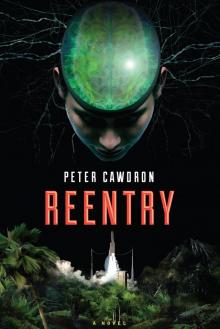 Reentry
Reentry Déjà Vu (First Contact)
Déjà Vu (First Contact) Wherever Seeds May Fall (First Contact)
Wherever Seeds May Fall (First Contact) But The Stars
But The Stars Trixie & Me
Trixie & Me Collision
Collision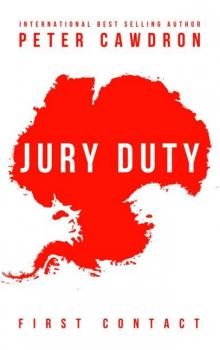 Jury Duty (First Contact)
Jury Duty (First Contact) Losing Mars
Losing Mars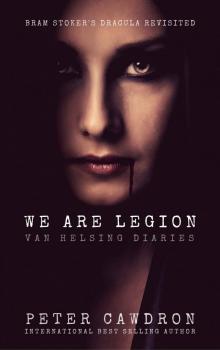 We Are Legion (van Helsing Diaries Book 2)
We Are Legion (van Helsing Diaries Book 2) Van Helsing's Diaries (Books 1-3): Nosferatu
Van Helsing's Diaries (Books 1-3): Nosferatu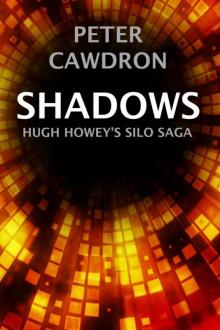 Shadows
Shadows 3zekiel (First Contact)
3zekiel (First Contact) Vampire (van Helsing Diaries Book 1)
Vampire (van Helsing Diaries Book 1) Xenophobia
Xenophobia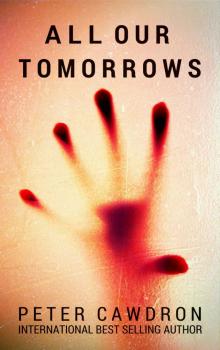 All Our Tomorrows
All Our Tomorrows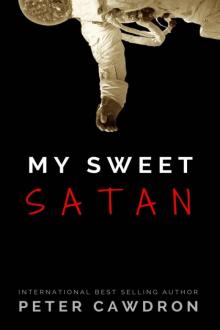 My Sweet Satan
My Sweet Satan Anomaly
Anomaly Monsters
Monsters